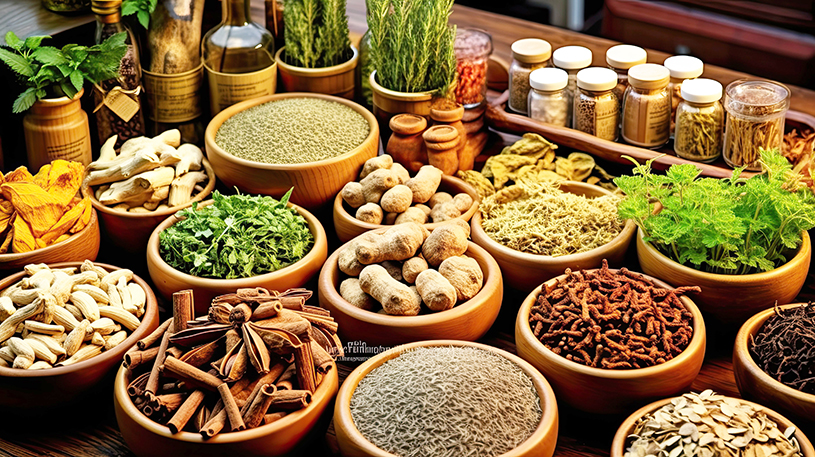Ayurveda: Timeless and Versatile
By Chahna Tailor Gupta

Happy October! If you’ve read my previous articles, then you know that I enjoy writing about Ayurveda. Ayurveda is such a deep science—it feels like you could study it for a lifetime and there would still be more to discover.
However, when I talk to others, one thing I hear often is that Ayurveda needs to be updated or that it’s no longer relevant. I respectfully disagree. While it’s true that our world has changed drastically since Ayurveda’s origins, the fundamental principles of this ancient science remain just as relevant today.
Ayurveda is rooted in balance—balance of the mind, body, and environment. Considering the global health challenges we face, such as stress, anxiety, and lifestyle-related diseases like diabetes and heart conditions, many of these issues stem from imbalance. Ayurveda offers a holistic approach to address these modern problems. It’s not about outdated methods or rigid rules; it’s about understanding your unique body type, or dosha, and living in harmony with nature. The wisdom of Ayurveda allows us to adapt its principles to our modern lifestyles while honoring the deep science behind it.
In fact, Ayurveda is much more than just herbal remedies or dietary advice. Did you know there are actually eight distinct branches of Ayurveda? These branches demonstrate the breadth and depth of the system, making it as comprehensive as any modern medical science. Here’s a brief overview:
- Kaya Chikitsa (Internal Medicine): Treating diseases by balancing the body’s energies (doshas) through diet, herbs, and detoxification.
- Shalya Tantra (Surgery): Ancient surgical techniques that also include modern aspects of invasive treatments.
- Shalakya Tantra (ENT and Ophthalmology): Focusing on ailments of the head and neck, including eyes, ears, nose, and throat.
- Bala Chikitsa/Kaumarabhritya (Pediatrics, Obstetrics, and Gynecology): Caring for infants, children, and mothers during pregnancy.
- Agada Tantra (Toxicology): Addressing poisons, toxins, and antidotes, including environmental and internal toxins.
- Bhuta Vidya (Psychiatry and Spiritual Healing): Treating mental health and spiritual afflictions.
- Rasayana (Rejuvenation and Geriatrics): Promoting longevity, vitality, and overall wellness through lifestyle, diet, and herbs.
- Vajikarana (Aphrodisiac Therapy and Reproductive Health): Addressing fertility, vitality, and sexual health.
Just from this breakdown, it’s clear that Ayurveda is versatile and can address a wide range of issues. It remains relevant, not just in ancient times, but also in modern healthcare—whether through alternative, complementary, or integrative approaches. Ayurveda is timeless, and its principles still hold the key to addressing many of the issues we face today.
If you find this interesting and want to explore more, there’s an upcoming Ayurveda conference titled Ancient Wisdom, Modern Wellness, hosted by the Ayurveda Association of Florida and International Hindu University in Lauderhill, FL, on Sunday, October 27th. We’d love for you to join! For more information, visit flayurveda.com.
About the Author
 Chahna Tailor Gupta, an Ayurvedic Practitioner and certified yoga teacher, has a background in occupational therapy and health science with a focus in public health. Chahna was yoga trained in Rishikesh, India and had ayurvedic clinicals in Kannur, Kerala. Chahna provides yoga, pranayama, meditation, 200-hr yoga teacher training, and ayurvedic health counseling services through her company Namaskar To You. Chahna is a volunteer for Ekal Vidyalaya, American Association of Ayurvedic Professionals (AAAP), and Ayurveda Association of Florida (AAF). She is currently pursuing a doctoral degree in Ayurvedic Medicine while continuing her self-studies in yoga.
Chahna Tailor Gupta, an Ayurvedic Practitioner and certified yoga teacher, has a background in occupational therapy and health science with a focus in public health. Chahna was yoga trained in Rishikesh, India and had ayurvedic clinicals in Kannur, Kerala. Chahna provides yoga, pranayama, meditation, 200-hr yoga teacher training, and ayurvedic health counseling services through her company Namaskar To You. Chahna is a volunteer for Ekal Vidyalaya, American Association of Ayurvedic Professionals (AAAP), and Ayurveda Association of Florida (AAF). She is currently pursuing a doctoral degree in Ayurvedic Medicine while continuing her self-studies in yoga.




























